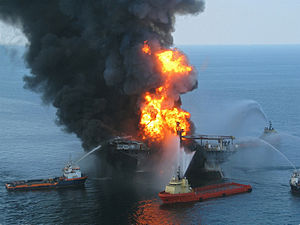
Bill Maher via Twitter:
Every asshole who ever chanted 'Drill baby drill' should have to report to the Gulf coast today for cleanup duty

Every asshole who ever chanted 'Drill baby drill' should have to report to the Gulf coast today for cleanup duty

 But even assuming all goes as planned, a newly independent Southern Sudan faces seemingly insurmountable development obstacles including:
But even assuming all goes as planned, a newly independent Southern Sudan faces seemingly insurmountable development obstacles including:WE’RE AT WAR! An insistence on factual accuracy is a luxury we can’t afford when the nation faces an existential threat, such as the top marginal tax rate being raised back up a couple percentage points from its all-time historical low to its previous all-time historical low. It’s just like Pearl Harbor (if the Japanese had only mildly dented 5 percent of the ships in our Pacific fleet while actually performing some needed maintenance on the remaining boats)!


Slim, I hate to disagree with you, but I would not classify some of the items from the list in your previous post as major security threats. I agree with most of them, but I do not think that lone gunmen or domestic based terrorists are major national security issues. Granted, I think they both could cause a lot of problems but neither of them represents a systemic threat to the United States. A lone gunman could assassinate a politician or kill a lot of people, which would be very unfortunate, but the institutions of government and business would continue to function. As for domestic terrorists, I do not think that any white supremacist, ultra-nationalist, fundamentalist or other similar group could garner enough popular support to pose a serious threat.
I am not saying that these things are not dangerous, just that they are not the most plausible means through which the national interests of the United States could be threatened. It’s also worth noting that I am defining the national interests as primacy, territorial integrity, international stability, domestic tranquility, and a well-behaved economy. Lone gunmen and domestic terrorists could threaten domestic tranquility, but not to the extent that the US could “fail” as a country.
I also want to go back to my original argument for just a minute. The reason that I included socio-economic problems on my list is because they are very subtle and it’s easy to underestimate the threat they pose. Dr. Bernanke even testified in front of Congress that the exploding national debt could undermine foreign confidence in the United States and cause all sorts of problems. I agree with you that hard security threats are important to guard against, but if the US is going to fail then it’s going to be because of a socio-economic issue that policymakers never addressed. It’s like how one out every three Americans owns a gun, but the average American is much more likely to die from the results of poor lifestyle choices (heart disease, diabetes, and cancer) than from homicide.
If you were to make a Venn Diagram of the issues Tea Party members care about, and the issues Tea Party members are confused about, you'd only see one circle.
The feudal barons of the Middle Ages...declared all wars. And their miserable serfs fought all the battles. The poor, ignorant serfs had been taught to revere their masters; to believe that when their masters declared war upon one another, it was their patriotic duty to fall upon one another and to cut one another’s throats for the profit and glory of the lords and barons who held them in contempt. And that is war in a nutshell.)
The CIA refers to the fallout of reconstruction as 'blowback.' For those who are unfamiliar with the term, it is the result of concerted military/propaganda efforts to shift the cultural, political, or social leanings of a state. And blowback there has been. The reaction to reconstruction and further oppression was violent resistance that lasts to this very day. So yes Mr. CNN bigshot, much like our interference in Afghanistan during their war with the Soviets.

Anyway, I'll wait patiently and see if a new government actually gets installed, and then I'll wait some more and see if that government actually does anything different than the old one. Maybe they should learn from Ukraine's example and re-elect Bakiyev just to save everyone a lot of time.

 C'mon Mr. President! Doesn't plausibility have to factor somewhere into the calculus of "biggest threat" facing the nation? (If not, nuclear annihilation or an asteroid impact should sit higher than this.)
C'mon Mr. President! Doesn't plausibility have to factor somewhere into the calculus of "biggest threat" facing the nation? (If not, nuclear annihilation or an asteroid impact should sit higher than this.)



And outside, U.N. sanctions are reportedly limiting the North's ability to profit from weapons sales


In recent weeks, a speech on social unrest by a prominent Chinese scholar, Yu Jianrong, has been widely circulated on the internet in China. In it Mr Yu describes the emergence in recent years of a new type of social unrest, which he calls “venting incidents”: brief, unorganised outbursts of public rage against the authorities or the wealthy. China’s efforts to enforce “rigid stability”, he argues, were not sustainable and could result in “massive social catastrophe”. Even government officials, he notes, are giving warning in private of worse to come.
